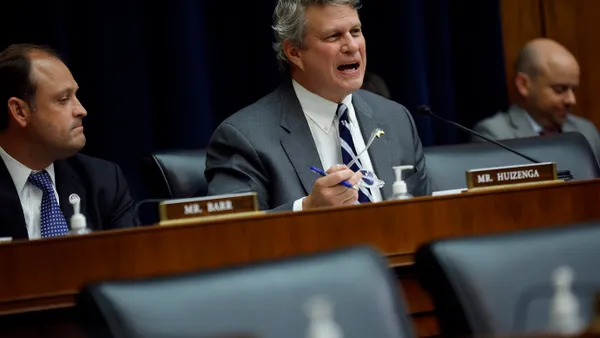Dive Brief:
- Three Democratic U.S. senators wrote an open letter last week to Cameron Fowler, CEO of Early Warning Services, asking that the company clarify and simplify its reimbursement policy for users of its peer-to-peer payment app Zelle who were victims of fraud and scams.
- Sens. Elizabeth Warren, Sherrod Brown and Jack Reed asked that big bank-backed EWS provide data by March 13 related to fraud and scams on Zelle from the last five years, including how much money the company has issued in refunds.
- “Since it appears that Zelle has not shared any specific information about its reimbursement policy, customers may not know that they can be reimbursed and, thinking they may not get any help, may not report these scams,” the Thursday letter said.
Dive Insight:
Last year, Scottsdale, Arizona-based Early Warning Services came under fire from senators, including Warren, after The New York Times reported in March 2022 that scams were flourishing on the app.
The following month, Warren’s office opened an investigation of Zelle, collecting fraud data from big banks and issuing a staff report in October 2022. The report found that fraud was both “rampant” and growing on the app, and that banks were not repaying “the vast majority” of victims.
While last week’s letter was critical of Zelle’s reimbursement policy, Warren, Reed and Brown did provide some praise in a letter last December to payment apps Venmo and Cash App, calling the reimbursements “an important step.”
In the past, Zelle reimbursed fraud victims in some cases where a bad actor initiated a payment from a consumer's account without authorization, but it broadened its policy recently to include reimbursement for additional types of scams.
“In June 2023, we shared that our 2,100 participating banks and credit unions must reimburse consumers for certain qualifying imposter scams,” an EWS spokesperson said in an emailed statement. “The change ensures consistency across our network and goes beyond legal and regulatory requirements.”
Nonetheless, the spokesperson added: “Sharing detailed parameters of the reimbursement benefit will make consumers vulnerable to further exploitation by criminals.”
Last week’s letter comes just after the same three senators wrote to the Consumer Financial Protection Bureau in support of a proposed rule that would give the CFPB more authority to oversee digital payment apps like Zelle.
Spokespeople for the senators were unavailable for comment on their open letter to the CFPB.
Correction: The story has been updated to correct descriptions of Zelle’s existing reimbursement policy and the CFPB’s rule proposal. An EWS comment was also added.











